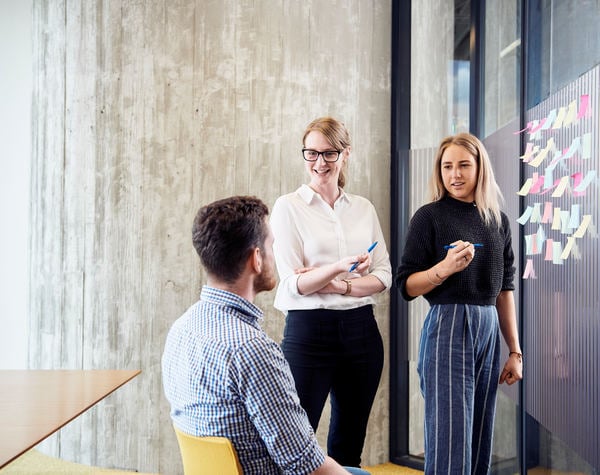The fascinating field of psychology invites anyone with a passion for understanding human behaviour to deep dive into what motivates us all. Just like Dr Ian Fuelscher, who embarked on his psychology journey driven by a curiosity about why people think and act the way they do. His fascination has blossomed into a remarkable career as a Senior Lecturer in the School of Psychology.
What to look for in a psychology degree
Knowing what you should prioritise when exploring top universities and the various psychology course options available can feel daunting. So, to help you navigate this important decision, we've asked Dr Fuelscher and Dr Meaghan Danby, a lecturer specialising in forensic psychology at Deakin University, to weigh in.
Practical learning
Dr Danby emphasises the importance of practical learning and real-world experience. 'You want to able to apply your skills and knowledge in placements so, at the end of your degree, you’re job ready.'
Flexible study options
'Look for flexibility in terms of how and when you study,' Dr Fuelscher says. You might want to fast track your degree or study part time, or do your course units online, when and where you please.
Supportive teaching staff
'You want staff that are knowledgeable and passionate,' Dr Fuelscher says. 'But also staff that care about your learning and are looking to inspire you.'
Diverse pathways
‘Psychology is very broad,’ Dr Danby says. ‘It includes lots of different areas of specialisation, research and learning.’ You want a degree that includes a variety of electives, so you can forge your own pathway.
We recognise that students want a job at the end of their degree. We speak with employers to identify what skills are useful. And then we offer students opportunities to engage with placements and internships.
Dr Meaghan Danby
Lecturer, Deakin School of Psychology
What to expect from Deakin's psychology courses
As a first year student studying psychology at Deakin, you'll be introduced to the core concepts of psychology, as well as the different specialisations. From second year you will start to choose electives that are more specialised like forensic, developmental or cognitive psychology. You'll learn a lot of other useful skills too, like communication, problem solving, critical thinking and digital literacy.
Dr Fuelscher and Dr Meaghan Danby answer questions about what it's like to study Psychology at Deakin University.
Who will I study alongside?
'Our students are really diverse,' Dr Danby says. 'We have a lot of school leavers, a lot of mature-age. Online we get people who might be working full-time or parents or people living in remote communities.'
'Our students have a range of interests,' Dr Fuelscher says. 'So you can be confident that there will be others interested in the more niche areas, such as organisational psychology or cognitive neuroscience.'
How flexible can it be?
At Deakin you can complete your entire undergraduate degree online. The School of Psychology has students living as far away as Alaska and as remote as the North-West Kimberley. Its digital-first approach means all lectures are live-streamed and there are plenty of interactive modules, online seminars and live chats.
What support will I get?
‘Deakin offers very strong support,’ he says. ‘Staff are accessible. We help students structure their degrees, plan their workloads and map out their assessments.’ This allows students to focus on their learning.
All the services available to campus students are also available to students studying online. This means all students have access to services like free counselling, health services and careers counselling.
#1 Victorian uni for graduate employment
If you want a degree that provides vital industry experience, invaluable academic support and helps secure your dream job, choose Deakin. We’re the #1 Victorian uni for graduate employment.
Will I study statistics?
'(Psychology students) need some understanding of statistics,' Dr Danby says, 'so they can critique research, and understand what they’re reading.'
But, she says, at Deakin 'it's delivered in a pretty friendly way, with a lot of support from lecturers and tutors.'
Dr Fuelscher agrees that statistics are taught 'in a way that is accessible, even for those wary of numbers or maths. We try and make it relevant, with real-world applications.'
Is there much group work?
'There are plenty of opportunities to engage in individual work and also in group-based work, both online and face-to-face,' he says. 'I think it's a good balance.'
'In our second and third year units, students practice peer-to-peer counselling skills and learn about techniques involved in counselling and coaching.'
Are there opportunities for practical experience?
'We've got two specialised units in second and third year that help students get ready for the workplace,' Dr Fuelscher says. 'Preparing for Employment gives insight into possible careers and we've got a whole subject where we help (students) secure a relevant internship in their area of interest. And then help them understand how psychology is applied in a workplace setting.'
What about specialisations in psychology?
Some students come to Deakin knowing exactly what they want to specialise in. Others come with a general interest in psychology and use their undergraduate degree to try things out, see what fits. Both are valid pathways.
Across the degree you can choose from several specialisations including cognitive neuroscience, clinical, forensic and criminal psychology. If you're interest lies in organisational psychology, Deakin is the only school in Victoria that teaches it. And Professor Michael Leiter is an internationally recognised lecturer in that course.
'Psychologists work in many areas,' Dr Fuelscher says. It's true. You'll find them in medicine, health, business, education, sport, HR – the list goes on. It's a vibrant and vital field that applies to everyone, everywhere. So why not turn your passion into your profession by studying psychology at Deakin?
Interested in pursuing a career in psychology? Check out how Deakin can take you there with a Bachelor of Psychology (Honours).

